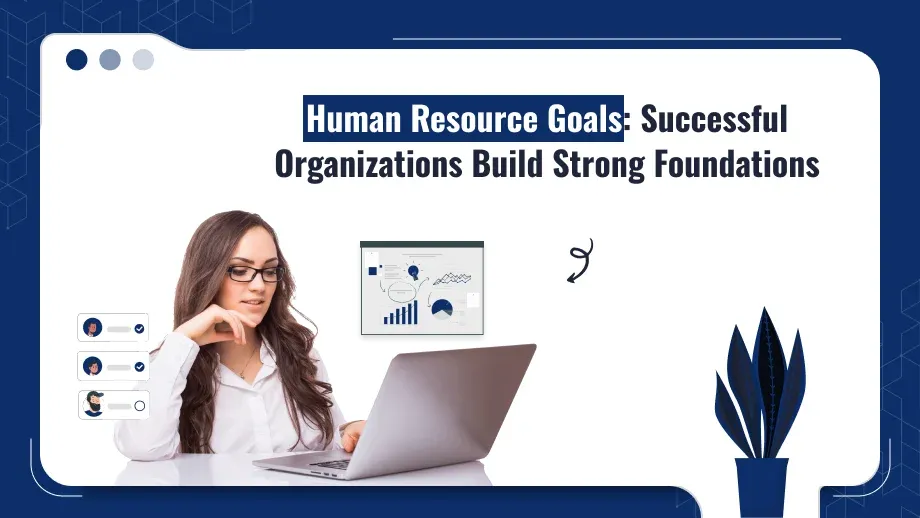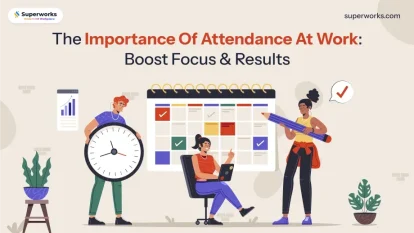SMART represents Specific, Measurable, Achievable, Relevant, and Time-bound, which reflects an organized way of setting clear and actionable HR objectives.
Grab a chance to avail 6 Months of Performance Module for FREE
Book a free demo session & learn more about it!
-
Will customized solution for your needs
-
Empowering users with user-friendly features
-
Driving success across diverse industries, everywhere.
Grab a chance to avail 6 Months of Performance Module for FREE
Book a free demo session & learn more about it!
Superworks
Modern HR Workplace
Your Partner in the entire Employee Life Cycle
From recruitment to retirement manage every stage of employee lifecycle with ease.


Seamless onboarding & offboarding
Automated compliance & payroll
Track performance & engagement
Human Resource Goals: Successful Organizations Build Strong Foundations
- strategic human resource management
- 8 min read
- November 27, 2024

Human resource goals play a significant role in aligning the workforce of a company with its long-term objectives. Good-defined HR goals would ensure the enhancement of employee satisfaction, and that’s how the organizations will not only attract proper talent but also empower their employees to get to the maximum of what is possible. Focus could either be on human resource management goals or strategic workforce alignment – understanding the right HR goals can significantly impact overall organizational performance.
Why Should You Set HR Smart Goals?
Setting human resource goals is the backbone of creating a workforce that is focused, efficient, and goal-oriented. These are Specific, Measurable, Achievable, Relevant, and Time-bound goals that help human resource teams and organizations achieve better performance by breaking broader objectives into workable steps. Smart goals in HR ensure that HR initiatives are aligned with the organization’s overall mission and will deliver measurable outcomes.
Align HR Efforts with Business Objectives
Human resource goals would help ensure that the principles of HR strategy are in complete alignment with what the company is looking to achieve. Whether it is recruitment, employee engagement, or retention, Smart goals offer a structured approach toward these objectives of goals of human resource management.
Example:
A Smart HR goal might be: “Reduce time-to-hire by 20% within the next six months to meet the company’s staffing needs.”
Measure Progress Effectively
The ultimate goal of HRM is tracking the effectiveness of HR initiatives. The Smart goals are measurable, hence enabling the HR teams to monitor their progress and make data-based decisions.
Example:
A Smart goal instead would be: “Increase employee satisfaction scores by 15% in the annual survey.”
Foster Accountability and Clarity
Using well-articulated, time-bound goals clarifies what is to be done by whom, thereby resulting in easier delegation of responsibility. It helps the employees and the HR team understand exactly what is expected from them, reducing confusion and boosting productivity.
Example:
“Implement a new employee recognition program by Q2 to enhance morale and retention rates.”
Encourage Continuous Improvement
Smart goals encourage HR teams to regularly analyze and fine-tune their strategies. Meeting time-bound and measurable objectives makes it easy for them to assess areas of improvement and respond rapidly to emerging challenges.
Example:
“Launch a leadership development program for 20 high-potential employees by the end of the year to build a strong succession pipeline.”
Enhance Employee Engagement and Performance
Aligning the efforts of employees with human resource performance objectives through the setup of Smart goals leads to better results. The workplace is more motivated when staff understand their role in achieving the organization’s vision.
Example:
“Increase the number of internal promotions by 10% in the next year to promote engagement and career development among employees.”
Simplify Goal Setting Across Teams
HR Smart goals make it easier to integrate objectives across departments. They are also a checklist to ensure that the HR objectives, be it recruitment or performance management, will align with other business functions, such as marketing or operations.
Example:
To improve diversity hiring, increase the percentage of diverse candidates hired from now till the next year by 20%.
Make sure you focus on the important things!
Let your human resource goals drive meaningful results for your team and business.
The Importance of Setting Smart HR Goals
The smartly set HR goals are an essential component of good human resource management. Such well-defined objectives not only provide clarity but also ensure that efforts made through HR are well-aligned with the organizational priorities.
Why Smart Goals Matter in Human Resource Management
- Clarity and Sharpen Focus: Human resource goals break down broad objectives into actionable steps that help an HR team focus on the right tasks at the right time.
- Measurable Progress: With clear metrics, HR professionals can track performance, see gaps, and adjust strategies in real-time.
- Employee Alignment: Smart goals teach employees the role they play in achieving organizational objectives and promoting accountability and engagement.
- Continuous Improvement: Regularly setting and reviewing Smart goals means that HR strategies adapt and change according to the changing business needs.
Implementing Smart goals within the human resource goals structure provides a structured approach whereby every implementing activity has a purpose and a measurable outcome.
Key Human Resource Goals for Organizations
Enhancing Employee Engagement and Retention
Employee engagement is one of the basic purposes of human resource management because it bears a direct relation to productivity and morale. Valued workers are engaged workers, and in turn, they are less likely to leave.
How to Achieve This Goal:
- Create regular feedback mechanisms to understand employee concerns.
- Offer personalized career development plans.
- Implement recognition programs to celebrate achievements.
In fact, retention strategies are part of a bigger human resources model for building a stable and growing workforce.
Streamlining Recruitment and Onboarding
Part of the overall goal in HRM is recruitment, and an effective recruitment process will indeed be a competitive advantage for any organization. More than this, effective onboarding ensures that new hires feel welcome and productive from day one.
Tips for Recruitment and Onboarding Success:
- Utilize an Applicant Tracking System (ATS) to streamline hiring workflows.
- Develop thorough onboarding programs that also introduce the company culture and policies.
- Measure recruitment efficiency through time-to-hire and cost-per-hire metrics
Use technology such as HRMS Payroll Software in India to better leverage recruitment efficiency.
Promoting Diversity, Equity, and Inclusion (DEI)
As a diverse, inclusive workforce brings creativity, innovation, and cooperation, in a globalized, often complex world, establishing DEI as a core HR goal ensures companies can attempt to tackle universal issues by upholding expectations among a multicultural workforce.
Steps to Promote DEI:
- Develop clear human resource policies that prioritize equity and fairness.
- Provide diversity training for employees and managers.
- Use data to monitor diversity metrics and identify areas for improvement.
Alignment of DEI with strategic human resource management therefore ensures diversity becomes a strategic asset rather than just a box-ticking exercise.
Supporting Leadership Development and Succession Planning
One of the critical goals of HR strategic goals is developing future leaders. The leaders of tomorrow should be recognized and groomed within the organizational setup. Effective leadership leads to continuity in times of succession.
How to Develop Leadership:
- Develop mentoring and coaching activities for high-potential employees.
- Educate on key leadership competencies: decision-making and resolving conflicts.
- Regularly review succession plans to ensure they align with business objectives.
These efforts directly impact human resource performance, creating a pipeline of capable leaders ready to take on new challenges.
Enhancing Employee Performance Through Goal-Setting
Performance management is a central aspect of HRM goals. With clear, measurable goals, employees are aware of the specific responsibilities expected of them; they are motivated to meet the expectations to a certain level.
Effective Goal-Setting Techniques:
- Very clearly defined using the Smart criteria: Specific, Measurable, Achievable, Relevant, and Time-bound.
- All the individual goals should be in unison with organizational objectives for an integrated strategy.
- Use performance review tools to track progress and provide constructive feedback.
The Role of Technology in Achieving Human Resource Goals
Modern HR tools and systems play a critical role in meeting human resource goals. For instance:
- HRMS Payroll Software in India: Automate payroll processes and ensure compliance with local laws.
- Best HRMS solutions are highly sophisticated, all-inclusive solutions for the management of employee data, performance tracking, and recruitment.
The use of technology in HR operations helps ensure efficiency and accuracy to allow teams to focus on achieving strategic goals.
How to Set Smart HR Goals
The Smart framework helps organizations set actionable and measurable HR objectives:
- Specific: Defined results can be, as “Reduce employee turnover by 10% in six months.”.
- Measurable: Metrics like retention rates, cost-per-hire, or engagement scores can be followed to ascertain the improvement achieved.
- Achievable: Goals must be achievable with available resources.
- Relevant: Align HR goals with broader business strategies.
- Time-Bound: Set deadlines to maintain accountability.
Examples of Smart goals for employee development include: “Conduct monthly leadership training sessions for 15 high-potential employees over the next year.”
Challenges in Meeting Human Resource Goals
Achieving HR goals often comes with its share of challenges:
- Budgetary constraints: The absence of sufficient funds to undertake new and advanced tools or programs is a limitation.
- Resistance to Change: Employees and managers may oppose new HR initiatives.
- Measuring Success: Tracking the ROI of HR efforts can be complex, especially for intangible goals like engagement.
To address these challenges, HR teams should use data-driven approaches and continue to develop their strategies.
Conclusion
Human resource goals are at the core of a successful organization. It shapes everything from recruitment to leadership development. With the agenda of employee engagement, DEI, and performance management, HR teams can, therefore, yield value to the growth of a business. Tools like HRMS Payroll Software in India and the best HRMS systems allow for efficiency and compliance in achieving these goals. Start today setting and achieving your human resource goals, creating a stronger and more resilient organization that can thrive through a competitive landscape.
FAQs
What does SMART stand for in HR goals?
How do SMART goals align HR efforts with company strategy?
SMART goals ensure that all the HR activities go along with the business objectives by setting measurable targets that address workforce needs and organizational priorities.
Can SMART goals help with employee engagement?
Yes, SMART goals can enhance employee engagement because they present expectations and track progress, thus fostering motivation and accountability.
What methods can assist in establishing and tracking HR SMART goals?
HRMS systems, applicant tracking software, and performance management platforms stand out as some of the most effective tools that will define, measure, and monitor SMART goals on behalf of HR professionals.
How often should HR SMART goals be reviewed?
HR SMART goals should be reviewed quarterly or semi-annually to ensure they remain in line with organizational changes and milestones.


